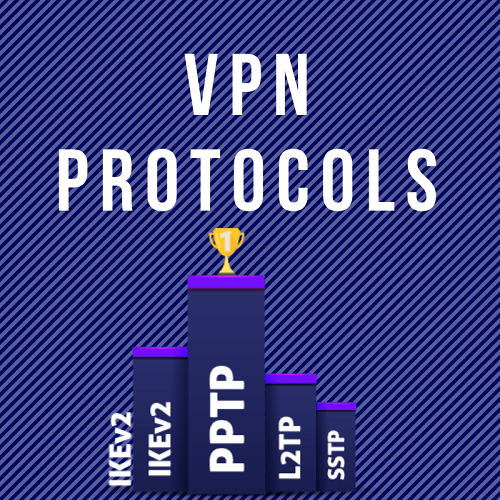
While it’s obviously clear that a VPN can help you stay anonymous in USA, often times it’s confusing to choose a best VPN protocol in USA that actually works with your application.
For instance, you might prefer L2TP/IPsec for streaming movies in USA rather than OpenVPN TCP.
Why…?
You see… it’s not so much about the brand of VPN service you opt, it’s the protocols that work behind it. Choosing the right protocol can make a hell of a difference in the way you use VPNs.
But that’s easier said than done. There are literally so many protocols these days that it’s hard not to feel overwhelmed.
Don’t worry though, as in this blog, I’ll discuss various VPN protocols in USA 2023 and make it super simple for you guys to understand.
What Are VPN Protocols In USA?

VPN protocols in USA are nothing more than routing mechanisms. They decide how your data travels between the VPN servers and your computer.
Having said that:
Each protocol is different than the other. Some are optimized for speeds, while others are geared more toward privacy.
There are also that may utilize the protocols that I am going to explain below.
Best VPN Protocol In USA 2023
Down below, ill list and discuss 6 of the VPN’s best protocols in USA of 2023 that are being used in the industry.
1. OpenVPN
Although a rather new protocol in the VPN industry, it is amongst the finest protocols you can opt in USA. It’s open source, secure and highly flexible, hence the name OpenVPN.
Being open source, OpenVPN can be easily tested for vulnerabilities.
Besides being open source, it is heavily geared towards privacy in USA. It offers military grade AES-256 bit encryption along with 2048-bit RSA authentication and 160-bit SHA1 hash algorithm.
Now I know all these jargons might sound like gibberish to you, but trust me, they don’t joke around with privacy.
Another cool thing about OpenVPN is that it is cross platform compatible. You can use it with pretty much any mainstream operating system and platform.
| Windows | MacOS | Linux | Android | IOS | Routers |
|---|
There are two different variants of OpenVPN protocols in USA, OpenVPN TCP and OpenVPN UDP. Both are night and day different from one another, which is why I’ll explain it under separate headings below.
-
OpenVPN-TCP
As you might have already guessed it, OpenVPN-TCP uses “Transmission control protocol” for packet transmission in USA.
TCP is connection oriented protocol, meaning as long as you exchange data, the connection between you and the other computer stays alive.
Another cool thing about TCP is that it’s a stateful protocol, meaning every time you transmit a data packet you get a confirmation packet in return. In case you don’t receive a confirmation, your packet is sent back.
Still with me…?
Good!
In other words, TCP ensure your data is reliably transmitted and intercepted over the internet in USA. It guarantees delivery of data.
-
OpenVPN-UDP
OpenVPN-UDP on the other hand uses “User datagram protocol” for transmitting data over the internet in USA. Taking a different approach than TCP, UDP focuses more on low latency rates as opposed to reliable data transmission.
In other words, UDP ensures your data gets delivered on time in USA. It does that by reducing the number of checks, which ultimately results in low latency.
Although reducing the number of checks on a data packet does make UDP perfect for gaming and video streaming in USA, it does also take away the reliability you get with TCP. You should explore more for more insights about these both.
- Open source
- Highly flexible and customizable
- Can bypass most firewalls
- Can support different encryption algorithms
- Highly secure
- Compatible with multiple encryption methods
- Technical setup procedure
- Does require third-party software to work
2. L2TP/IPsec
L2TP or Layer 2 Tunneling Protocol in itself doesn’t offer any encryption at all. It is pretty much why you’ll never see this protocol being used alone. In fact, it is always paired with IPsec, which is an actual encryption protocol.
Once used in conjunction, L2TP/IPsec can offer powerful privacy and security in USA. It’s compatible with most mobile and desktop clients, offer 256-bit military grade encryption and doesn’t contain any loopholes or vulnerabilities.
- User-friendly setup process
- Compatible with different platforms and devices
- Provides high level of security
- Support multithreading
- Blocked by firewalls
- Weakened over time by NSA
- Not all that fast
3. SSTP
Secure Socket Tunneling Protocol is a very stable yet powerful VPN protocol in USA. Originally launched with windows vista, it is one of the most robust products of Microsoft.
So much so, that it’s nearly integrated in every machine running Microsoft’s Windows operating system.
SSTP is also quite secure and uses 2048-bit SSL /TLS certificates for authentication and 256-bit SSL keys for encryption purpose.
Besides being Windows compatible and able to run software like Winlogon or smart chip, SSTP is also compatible with Mac, Android, Linux, iOS and BSD systems too. View a list of top 5 SSTP VPNs in USA with setup guide.
- Can bypass most system firewalls
- Highly secure
- Does support many encryption algorithms
- Relatively easy to use
- Extensively integrated in Windows platform
- Corporation owned (Microsoft soft)
- Works better on Windows than other platform
4. IKEv2
IKEv2 or Internet Key Exchange version 2 is a brainchild of Microsoft and cisco. Similar to L2TP, IKEv2 is pretty much a VPN tunneling protocol as opposed to an encrypted one.
It’s pretty much why it is rarely ever used alone and more often than ever it is used in conjunction with IPsec.
The cool thing about IKEv2 protocol is that it is very stable. It’ll keep you connected even if your internet connection drops or resets. Apart from that, VPNs like ExpressVPN is the fastest and the best VPN with IKEv2/IPSec protocol in USA.
Although not as popular as some of the other protocols discussed in this blog, it is natively compatibility with Windows, Blackberry, iOS, Linux and Android devices.
- Very secure protocol
- Supports a wide range of VPN authentication protocols
- Easy to setup
- Considerably fast VPN protocol
- Very stable
- Can get blocked by firewalls
5. PPTP
PPTP is amongst the oldest protocols around, so much so, that it has almost become obsolete. Launched all the way back in 1995, it has been replaced by much faster and secure VPN encryption protocols in USA.
Having said that:
PPTP hasn’t been completely discarded, in fact, it is still around and mostly used in scenarios where speed is preferred over privacy.
Speaking of privacy, PPTP is no longer secure as it used to be back in the day. Needless to say, you wouldn’t necessarily want to use this protocol in USA for your sensitive data.
- Extremely fast
- Very easy to use
- Compatible with different operating systems
- Considerably unsecure
- Can get blocked by firewalls
- Has NSA involvement
6. SoftEther
Similar to OpenVPN, SoftEther is an open source VPN protocol in USA. Released all the way back in 2014, SoftEther has quickly gained popularity since then.
Like I said, SoftEther is quite similar to OpenVPN, in fact, it even uses the same security protocols (i.e. SSL with 256 Bit AES encryption).
Besides being similar to one of the most powerful VPN protocolin USA , SoftEther has quite an extensive support for a wide range of platforms. Linux, Windows, Mac, Android, FreeBSD, and Solaris operating systems are all covered by this protocol.
Not only that, SoftEther also supports a bunch of other protocols, like SSTP, OpenVPN, EtherIP and L2TP/IPsec.
- Extensive support for a wide range of platforms and protocols
- Open source
- Fast but compromises on security
- Can bypass some firewalls
- It’s comparatively newer in the industry
- Does not provide native operating system support
Best VPN Protocol In USA Summarized

Now you might be feeling overwhelmed reading about all the protocols mentioned above. Don’t worry, I’ll summarize them down below.
- OpenVPN– Provides safest encryption but slows down connection speeds in USA
- L2TP/IPsec– An overall impressive tunneling protocol good for speed related tasks but could be blocked because of using single port in USA
- SSTP–Tough to trace and highly secure in USA
- IKEv2–Fast, secure, mobile friendly and open source VPN protocol in USA
- PPTP– Supports multiple platforms but does contain security loopholes and vulnerabilities in USA
- SoftEther– Relatively new VPN protocol but just as secure in USA, open source and multi-platform compatible as OpenVPN.
| Protocol | Speed | Encryption & Browsing | Stability | Media Streaming | P2P File Sharing | Compatibility |
|---|---|---|---|---|---|---|
| PPTP | Fast | Poor | Medium | Good | Good | Almost Compatible with all major platforms |
| L2TP/IPsec | Fast | Medium | Good | Good | Good | Almost Compatible with all major platforms |
| IKEv2/IPsec | Fast | Good | Good | Good | Good | Almost Compatible with all major platforms |
| OpenVPN TCP | Medium | Good | Good | Medium | Good | Almost Compatible with all major platforms |
| OpenVPN UDP | Fast | Good | Medium | Good | Good | Almost Compatible with all major platforms |
| SSTP | Medium | Good | Medium | Medium | Good | Windows |
| SoftEther | Fast | Good | Good | Good | Good | Almost Compatible with all major platforms |
Best VPN Protocols In USA and their applications
-
Best VPN Protocol In USA for Streaming

Connection speeds and VPN protocols security both go hand in hand in USA. Therefore, you will need to compromise on speed if you want maximum online protection. When you wish to use best VPN protocol in USA for streaming purpose, nothing comes close to PPTP.
The above-explained VPN protocol offers fastest streaming speeds to its users in USA. On the other hand, PPTP does have the weakest encryption level.
If you want to attain the right balance between speed and security, OpenVPN turns out to be a right choice. It offers both security and reasonable speed coupled with 256-bit military grade encryption. Therefore, you are able to obtain next level security according to your own terms.
Best choice: PPTP
-
Best VPN Protocol In USA for Gaming

Interestingly, gamers cannot undervalue the importance of speed. In order the seamlessly enjoy online gaming you need to choose a lag free and fast VPN protocol in USA.
Luckily, you do have different protocols available at your disposal. In this case, PPTP protocol comes in handy as it offers the fastest speeds for online gaming.
Best choice: PPTP
-
Best VPN Protocol for China

When it comes to protecting your online privacy, you can select different protocols. These protocols are PPTP, L2TP, OpenVPN and SoftEther. As you already know, SoftEther is a multi VPN protocol. Therefore, you can use SoftEther within China to attain online security and anonymity stress-free.
Still, you can avail PPTP, L2TP and OpenVPN protocols to unblock and access your favorite streaming sites in China securely. However, you will have to use obfuscating methods to take benefit from OpenVPN in the country.
Likewise, you can select PPTP and L2TP as long as your VPN provider is not blocked by great firewall (GFW) in China.
Best choice in USA: SoftEther or OpenVPN
Faqs – Best VPN Protocol In USA
Which VPN protocol in USA should I use?
This question isn’t as straight forward as one might think. There are tons of different protocols and all of them are more or less designed to cater different applications. Besides, with VPN protocols in USA, one size fits all concept doesn’t work.
If you’re looking for speed, go for a tunneling protocol like L2TP/IPsec but if you prefer security, definitely choose OpenVPN in USA.
Which is better in USA PPTP or OpenVPN?
Like I said, it’s not possible to deem one protocol better than the other, however, if you compare the two protocols, OpenVPN should be your best bet.
Not only is PPTP ancient by today’s standards, it’s also not as near as safe as OpenVPN in USA.
What is the fastest VPN protocol in USA?
While there are more than one contender for the fastest protocols in USA, only PPTP is truly the fastest. The reason why it is so fast is because it has considerably less encryption overhead to deal with as some of the other protocols.
This results in a fast but considerably unsecure VPN protocol in USA.
Which VPN protocol supports most platforms in USA?
While there are some VPN protocols in USA that are limited to specific platforms, there are some that offer support for a wide range of devices. Speaking of which, PPTP supports the most number of platforms. However, L2TP/IPsec is also not very far behind.
What is the most secure VPN protocol in USA?
If rock solid privacy is your main concern, nothing even comes close to OpenVPN. It supports a number of different platforms and offers privacy unlike any other protocol in the industry today.
It is also why almost every top VPN provider in the industry prefers using OpenVPN in USA as their first line of defense.
Having said that, due to its powerful encryption, it can be a bit slower than some of the other protocols.
Wrapping Up!
There you have it folks, this was the complete rundown of best VPN protocol in USA currently being used in the industry.
I hope you now have a better knowledge of protocols. Hopefully now you’ll have a better time choosing the perfect VPN protocol for your application.
Do let me know which protocol worked best for you. I’ll absolutely love to hear from you guys.

Thanks